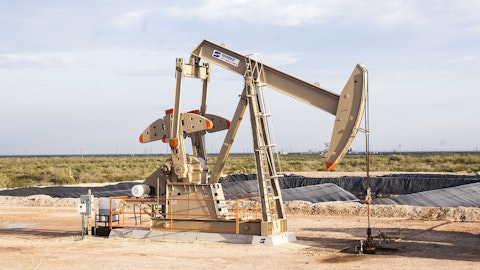Nine Energy Service, Inc. (NYSE:NINE) Q1 2024 Earnings Call Transcript May 7, 2024
Nine Energy Service, Inc. isn’t one of the 30 most popular stocks among hedge funds at the end of the third quarter (see the details here).
Operator: Greetings, and welcome to Nine Energy Service First Quarter 2024 Earnings Conference Call. At this time, all participants are in a listen-only mode. A question-and-answer session will follow the formal presentation. Instructions will be given at that time. [Operator Instructions] I would now like to turn the conference over to your host, Heather Schmidt, Vice President of Strategic Development and Investor Relations.
Heather Schmidt: Thank you. Good morning, everyone, and welcome to the Nine Energy Service earnings conference call to discuss our results for the first quarter of 2024. With me today are Ann Fox, President and Chief Executive Officer; and Guy Sirkes, Chief Financial Officer. We appreciate your participation. Some of our comments today may include forward-looking statements reflecting views about future events. Forward-looking statements are subject to a number of risks and uncertainties, many of which are beyond our control. These risks and uncertainties can cause actual results to differ materially from our current expectations. We advise listeners to review our earnings release and the risk factors discussed in our filings with the SEC.
We undertake no obligation to revise or update publicly any forward-looking statements for any reason. Our comments today also include non-GAAP financial measures. Additional details and a reconciliation to the most directly comparable GAAP financial measures are also included in our first quarter press release and can be found in the Investor Relations section of our website. I will now turn the call over to Ann.
Ann Fox: Thank you, Heather. Good morning, everyone. Thank you for joining us today to discuss our first quarter results for 2024. Revenue for the quarter was $142.1 million, which was within the upper range of our original guidance of $135 million to $145 million. We generated adjusted EBITDA of $15 million, reflecting an adjusted EBITDA margin of 11%, diluted earnings per share was negative $0.24. During Q1, the markets were relatively stable with the average US rig count remaining flat quarter-over-quarter. This was reflected in our revenue, which also remained relatively flat quarter-over-quarter, coming in where we anticipated. Despite a flat rig count, our adjusted EBITDA increased quarter-over-quarter due mostly to better utilization within coiled tubing.
Coiled tubing days work increased by over 40%, driving revenue growth of approximately 11% quarter-over-quarter. Demand for coiled tubing work was strong in the Permian, and we were able to supplement this work by sending equipment and personnel to the region from the Haynesville. Completion to our revenue was relatively flat quarter-over-quarter. We reached a major milestone in Q1, surpassing 60,000 dissolvable Stinger units sold since we introduced the technology in Q1 of 2020. I am extremely proud of the team and the way they scaled this product without compromising quality and reliability. We remain bullish on not only the capability of our dissolvable technology, but on the continued adoption of dissolvable plugs in the US market and abroad.
In Q1, we began to see the impact of pricing pressure within our cementing business as we balance market share and profitability within this rig count environment. In wireline, we maintained excellent market share in the Northeast and continue to focus on gaining additional market share in the Permian while increasing exposure to remedial and conventional wireline. I would now like to turn the call over to Guy to walk through detailed financial information.
Guy Sirkes: Thank you, Ann. As of March 31, 2024, Nine’s cash and cash equivalents were $10.2 million with $27.3 million of availability under the revolving ABL credit facility, resulting in a total liquidity position of $37.5 million as of March 31, 2024. At March 31, we had $52 million of borrowings under the ABL credit facility. As a reminder, during Q1, we had a $19.5 million interest payment for our notes and paid down $5 million on the ABL. Additionally, we had $5.6 million of CapEx for the quarter. As a result, our cash balance as of March 31 was out of trough, and we have already begun to build back our cash balance. All of these cash outflows were anticipated, and our cash balance will continue to ebb and flow in conjunction with our interest payments that are made in January and August.

At the end of last year, we put a $30 million ATM program in place to provide flexibility for the company. During Q1, we did not sell any shares under the ATM program and have not sold any to date. As per the terms of the indenture governing our senior secured notes, we are required to periodically offer to repurchase such notes with a portion of any excess cash flow. We did not generate any excess cash flow as defined in the indenture in the most recently ended two fiscal quarters. As a result, no excess cash flow offer will be made to note holders this month. A reconciliation of this calculation is available in our Q1 earnings release. During the first quarter, revenue totaled $142.1 million with adjusted gross profit of $26.1 million. During the first quarter, we completed 943 cementing jobs, a decrease of approximately 3%.
The average blended revenue per job decreased by approximately 5%. Cementing revenue for the quarter was $48.3 million, a decrease of approximately 8%. During the first quarter, we completed 6,486 wireline stages, an increase of approximately 14%. The average blended revenue per stage decreased by approximately 13%. Wireline revenue for the quarter was $27.9 million, which was flat compared to Q4. For completion tools, we completed 28,074 stages, an increase of approximately 4%. Completion tool revenue was $35.3 million, a decrease of approximately 2%. During the first quarter, our coiled tubing days worked increased by approximately 41% with the average blended day rate decreasing by approximately 21%. Coiled tubing utilization was 63% with revenue of $30.7 million, an increase of approximately 11%.
During the first quarter, the company reported general and administrative expense of $12.3 million. Depreciation and amortization expense was $9.5 million. The company’s tax provision was approximately $0.2 million for the quarter, the provision for 2024 as a result of our tax position in state and non-US tax jurisdictions. The company reported net cash used in operating activities of $8.8 million. The average DSO for Q1 was 57.5 days. CapEx spend for Q1 was $5.6 million. Our 2024 CapEx guide is unchanged at $15 million to $25 million, but is flexible if market conditions dictate a reduction. I will now turn it back to Ann.
Ann Fox: Thank you, Guy. Q1 activity levels were stable driven mostly by a supportive oil price. However, we saw further declines in natural gas prices below $2 starting in February and continuing into Q2. Because of this decline, we are anticipating activity slowdowns in the natural gas levered basins, including delayed completions, rig declines and overall more white space in the calendar specifically in the Northeast, Haynesville and with some impact in the Eagle Ford. As a reminder, in 2023 approximately 34% of Nine’s revenue was generated out of the Northeastern Haynesville. We view this decline in natural gas related activity as a temporary slowdown or pause and we remain positive on the medium and long-term outlook for the gas market.
It is imperative to maintain our footprint and people within these basins to ensure we are able to capitalize when gas prices recover. However, this will have short-term negative impacts on our margins. We are watching the markets very closely and we’ll adjust course as dictated by the markets and outlook. The oil markets have remained mostly stable with the majority of public companies keeping capital and activity programs flat in 2024 versus 2023 in the oil lever basins. There could be potential for additional rigs coming into areas like the Permian if commodity prices remain supportive in the second half of this year. We have supplemented our Permian operations with units and personnel from our Haynesville and Northeast locations specifically within coiled tubing and wireline.
For Q2, we anticipate activity declines in white space within the gas-levered basins, as well as full quarter realizations of pricing pressure within our cementing business. Because of this, we expect Q2 to be down compared with Q1 with projected revenue between $130 million and $140 million. We also anticipate that adjusted EBITDA and our adjusted EBITDA margin will decrease from Q1 levels. We have shown our ability to capitalize quickly on market shifts and our business is nimble. Our service and geographic diversity provides us good balance and we are focused on diversifying more of our top line revenue streams to completion tools in the international markets. Our strategy of providing an asset-light business with forward-leaning technology coupled with excellent service is unchanged.
We will now open up the call for Q&A.
See also Luxury on a Budget: 12 Affordable Smartphones with Premium Features and 20 Most Car Dependent Cities in the US.
Q&A Session
Follow Ninetowns Internet Tech Grp Co (NYSE:NINE)
Follow Ninetowns Internet Tech Grp Co (NYSE:NINE)
Receive real-time insider trading and news alerts
Operator: Thank you. At this time, we’ll be conducting a question-and-answer session. [Operator Instructions] Our first question comes from Waqar Syed with ATB Capital Markets. Please proceed with your question.
Waqar Syed: Good morning.
Ann Fox: Good morning Waqar.
Waqar Syed: Good morning. So the international business, are you assuming any sales from that in your revenue outlook, or anything substantial there?
Ann Fox: We always have a projection of that revenue. Just as a reminder, international revenue on an annual basis is roughly between 4% to 5% and it’s very lumpy as we’ve told the market before. So we would continue to anticipate having international sales in Q2.
Waqar Syed: Okay. And then Ann, the recent consolidation that we’ve seen in the E&P industry has that impacted your business positively or negatively? Or do you foresee that to impact going forward?
Ann Fox: It’s a great question Waqar. We definitely see continued consolidation. For us so far this has not been a negative impact. And when we analyze business with both Exxon and Pioneer we’re very pleased with that for example. So right now we’ve not seen a negative impact. And I think if anything you could start to see some consistency as we know with large publics, they tend to put out their D&C programs and budgets. And so that streamlines the process and frankly can help us. So to answer your question specifically no we’ve not seen any negatives.
Waqar Syed: Okay. And the issue on the pricing side in cementing, is it broad in all basins? Or is it very basin specific right now?
Ann Fox: Yeah. No it’s — well clearly, coming into the Haynesville has not been wonderful just given where gas prices are. But I would say, it’s more broad relative to the overall rig count environment in the United States right now. That pricing pressure is felt across basins.
Waqar Syed: Okay. Are you seeing stability in the spot pricing? Or do you see more pressure in that particular market as maybe some more rigs come off in the gas basis?
Ann Fox : The gas basins could, Waqar. I think though, we’ve taken that pricing impact. It’s just that you’ll get a full quarter of that realization in Q2. So we’re not seeing a downward slope on that right now, that has stabilized, but we did experience that.
Waqar Syed: And then in terms of your visibility into the second half on the let’s say, oil side first, are you seeing any discussions with E&Ps, privates or publics about picking up activity later this year or into next year?
Ann Fox : I think most of our publics have been pretty firm that they’re going to maintain flat programs this year. We do have some oil customers actually in the Northeast that I would be surprised if they don’t put a rig or two up later in the year. But by and large, our publics at the moment are steadfast in their programs. So as we know, that could always change. We’re seeing — obviously, folks are going to start to build ducts here, so it could be a very nice 2025, really nice duct builds in the Haynesville as well. So as you know, if the operators all start at once, that creates tremendous velocity for pricing. So it could be an exciting time for us coming into 2025.
Waqar Syed: Okay. And from the private side, any are you seeing any hints of them picking up activity or new privates being formed as more personnel become available from the consolidation in the E&P industry?
Ann Fox : No. No, we aren’t, Waqar. I would say, consolidation is more the theme of the day.
Waqar Syed: Okay. Well, thank you very much, Ann. Appreciate the color.
Ann Fox : Sure. Thank you.
Operator: Our next question is from Tim Moore with EF Hutton. Please proceed with your question.
Tim Moore : Thanks. Ann and Guy, two of my questions are about public and private. Operator sentiment was just asked and thanks for answering that. You mentioned cementing softness to continue in the June quarter. I’m just trying to think out — I know we talked about lead times on that and they seem to bounce back fast later on when there’s an upswing. I mean, would I be unreasonable thinking that maybe the cementing job count, not necessarily pricing could the volumes can maybe start increasing September or late summer? Or is that too quick based on visibility?
Ann Fox : No. I think that’s reasonable, Tim.
Tim Moore : Very good. I mean, eventually, they always bounced back. I mean, you just lapped downturns and the rig count has been quite stable since mid-September, especially on the oil side. So it seems like I’m not going to put work you out, it seems like it will be inevitable, but you’re not that far away from the bottom on the volume side on cementing.
Ann Fox : Yes. That’s how it feels.
Tim Moore : Good. And maybe just switching gears, how is the Pincer hybrid frac plug doing? And what are some of the customer responses to it?
Ann Fox : Well, we’re having a great response. We are in the middle of field testing right now with some customers and then also commercialized other customers. So as you know, that plug is hybrid, it has a little bit of dissolvable materials, some composite material, and it offers our customers much better drill-out times. And so it’s really for the customer that love the reliability and dependability as they perceive it with a composite, and that’s how we’re trying to answer that market and innovate really on the composite side. So it’s not an answer to replace the dissolvable plug. It’s really an answer to go after that very large composite market, which is still the preponderance of plugs run today in the U.S. And so we’re still very pleased with that. Thank you for asking.
Tim Moore : No, that’s great. I mean I really think it’s going to be very good. I can’t wait to hear a couple of years from now how many thousands of those you’ve sold because like you said, it’s not going to cannibalize, it’s incremental. So that’s a really good design there. And maybe just following up on international expansion. I know you get asked this a lot, I think I asked last quarter. I know it’s only maybe 4% to 5% of sales, but such a good untapped opportunity for you. Can you give any color maybe on some of the countries where you’ve done some demos and pilots the last couple of quarters, and where you think might be the focus countries the rest of this year?
Ann Fox: Sure. So as you know, we sell into about 22 countries, but the majority of our sales will be in the Middle East region as well as Argentina. And so when you think about the Middle East, you’re talking mostly about the UAE, as well as Saudi.
Q – Tim Moore: Great. And how do you like to handle capacity for the country, I mean it seems like it could be full up demand there. Are you — I mean I guess, you’re probably working hard to add extra capacity as orders come in and you’re able to satisfy them.
Ann Fox: Yes. We have not had a problem with that, thus far. So I think we do a really good job of managing that supply chain. So, so far that’s not been a bottleneck.
Q – Tim Moore: Great. Great. Just two other quick questions. I know, you reiterated the capital expenditure guidance this year $15 million to $20 million, you spent almost $6 million in the first quarter. What point this year? I mean, would you decide, if you might be more towards the lower end or the high end of that range, you probably will wait to see how things shake out this summer and then maybe finish your CapEx budget September October?
Ann Fox: Right. So, it’s a great question. So we’ve guided the market $15 million to $25 million, with a back-end loaded range. And if for some reason this summer, we don’t see any turn in anticipated gas pricing coming into the winter season, then obviously, we’d make adjustments. So we’ve purposely planned flexibility to do just that. So I think we’re all waiting to see, what is the weather shape out like ,where is gas production fall and what do those gas prices look like. So we’re ready to make those changes. And as you know, we’re always very flexible here, with CapEx.
Q – Tim Moore: Great and thanks a lot. And that’s it for my questions. Ann and Guy, appreciate it
Ann Fox: Thank you.
Operator: Our next question is from John Daniel with Daniel Energy Partners. Please proceed with your question.
Q – John Daniel: Hey, Ann. Hi there team. Just one for me. And we had several of the E&P companies this quarter, talk up opportunities on the refrac market. And I’m just curious, how you see that opportunity set over the next few years? And is it…
Ann Fox: Well – Good morning, John. Thank you. That’s a great question. I think you’ve started to see some of our public companies actually make this part of their program, and talk about it routinely. So the technology has changed here a lot. We actually forecast refrac into our business now. We’re one of very few companies in the US that offers this solution. So, this is a wonderful niche market for us, and we’re really excited to continue to see it grow. We’ve experienced certainly a lot of growth last year. We’re looking forward to more growth this year. So, very promising market. They certainly are looking at it from a production capacity, we’re also aware that these are obviously cleaner barrels. So, all the way around, these refracs are making a ton of sense and we’re seeing wonderful results thus far, with our refrac technology.
Q – John Daniel: Okay. That’s all I had. Thank you for including me.
Ann Fox: Okay. Great. Thank you so much.
Q – John Daniel: You bet.
Operator: This concludes…
Ann Fox: Okay. Great. Thank you for your
Operator: Go ahead, Ann.
Ann Fox : I was just saying, we wanted to thank our employees and our E&P partners and investors. Thank you all so much.
Operator: This concludes today’s conference. You may disconnect your lines at this time and we thank you for your participation.
Follow Ninetowns Internet Tech Grp Co (NYSE:NINE)
Follow Ninetowns Internet Tech Grp Co (NYSE:NINE)
Receive real-time insider trading and news alerts





